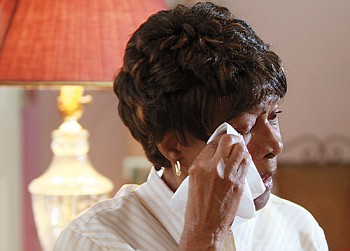Jereline Sanders raised both her younger brothers and her two daughters by working a variety of jobs over the past half-century.
But when a heart attack and failing dental implants forced her to quit cooking and give up her beauty shop and clothing store, the 69-year-old Eastdale woman also thought she was going to lose her Ridgemont home.
"I've lived here nearly 41 years and I love this house, but I really was afraid when I started getting foreclosure notices," Sanders said.
After refinancing and then defaulting on a refunding loan, Sanders was among 3,576 property owners in metropolitan Chattanooga who got a bank notice last year indicating they would lose their property unless they paid their delinquent mortgages, according to figures released today by RealtyTrac.
With the help of a federally funded counseling program from Chattanooga Neighborhood Enterprise, Sanders managed to rework her loan and keep her house.
In Hamilton County, 1,325 property owners last year were not so fortunate and lost their homes or businesses to foreclosure. Although down from the record high reached in 2009, many experts fear foreclosures could rise still higher this year.
"Unfortunately, foreclosures are often a lagging indicator, and with continued high unemployment I'm afraid the numbers could be even worse in 2011," Ted Fellman, executive director for the Tennessee Housing Development Authority, said Wednesday.
RealtyTrac reported today that the number of properties entering the foreclosure process grew by 9.5 percent in metropolitan Chattanooga last year, growing to one of every 65 homes.
Despite the local increase, however, the foreclosure rate in Chattanooga was still 30 percent below the nationwide average of a foreclosure for every 45 U.S. homes in 2010, RealtyTrac said.
"Foreclosure became more widespread in 2010 as high unemployment drove activity up in 72 percent of the nation's metro areas -- many of which were relatively insulated from the initial foreclosure filing in 2010," RealtyTrac President James Saccacio said in a report released today.
Safe at home
With the help of CNE and other counseling services, Sanders and others facing foreclosure are reworking personal budgets, restructuring mortgages and stretching out or deferring payments to pay off delinquent mortgages.
Foreclosure specialists Blane Andrews and Jeremy Fitzsimmons at Chattanooga Neighborhood Enterprise worked for months with Sanders and her lender, Bank of America, to resolve a $7,000 debt delinquency while still cutting her mortgage payments in half in line with her $12,900-a-year Social Security income.
"Blane and Jeremy just stuck with me all the way and got my loan and monthly payments down to where I can stay in my house," Sanders said. "They were a real blessing."
CNE worked with nearly 350 other homeowners facing foreclosure last year, and so far more than 90 percent of those are still in their home. Fitzsimmons said he tries to educate troubled borrowers about their options and work with lenders to work out arrangements to cut unpaid loans down to a more manageable level.
"Some of it is just trying to buy time to give people time to find another job or figure out how they can refinance their debt and stay in their home," he said.
Fitzsimmons, a former commercial banker who has worked on hundreds of mortgage loans through his career, equates his work to "having great friends who can help you with your plumbing job."
"When you get into these workout options, you want to have somebody who understands the best options for you," he said. "We're that point of reference, and we're here through the life of their problem."
CNE is one of 19 agencies designated by the Tennessee Housing Development Authority to administer foreclosure counseling through the National Foreclosure Mitigation Counseling program. In Georgia, 39 agencies statewide provide foreclosure counseling services, including the Dalton-Whitfield Community Development Corp. and the Dalton-Whitfield Community Development agency.
Counseling pays off
A new federal study of such programs found that those who get such foreclosure counseling are 70 percent more likely to stay in their home and repay at least a portion of their debt.
Homeowners who obtained a mortgage modification through National Foreclosure Mitigation programs like that offered at CNE save an average of $555 per month through lower payments, compared to savings of just $288 per month for homeowners who don't work with such counselors,
Where to get help:Chattanooga Neighborhood Enterprise, 664-HOME (4663)Dalton-Whitfield Community Develop-ment Corp., 706-876-1630Costs of foreclosure$75,000 -- Negative impact on neighboring home values$50,000 -- Average loss for lender in lost principal and interest and extra foreclosure expenses$19,000 -- Extra costs and lost revenue for local government$7,000 -- Average homeowner lossSource: Joint Economic Committee of Congress
according to a study by the federal Department of Housing and Urban Development.
Such foreclosure prevention counseling is being funded at 1,700 agencies across the country through $475 million appropriated by Congress to help address the housing slump.
Fellman said among 7,900 people served by foreclosure counseling services over the past two years in Tennessee, less than 4 percent have lost their homes so far to foreclosures. Thirty-five percent have successfully modified their mortgage and a comparable share are still working toward loan reworks. Others sold their houses in short sales prior to foreclosure, filed for bankruptcy or simply changed their personal spending habits to get current on their debt again.
"These programs have been very successful, but the key is for people who are in trouble to come in early and get help as soon as possible," he said.
More participants wanted
David Johnson, president of CNE, which launched its foreclosure mitigation program in May 2008, said more people need to take advantage of CNE's free assistance.
Among the 1,325 completed foreclosures in Hamilton County last year -- and hundreds of others who got initial foreclosure notices -- only about one in four sought help from CNE.
"That's a pretty low percentage for a service that gets results," he said.
Foreclosures are not only costly for homeowners and their lenders.
Studies indicate that foreclosures also depress the value of neighboring properties and cut local tax collections.
Just the number of foreclosures CNE helped to prevent last year could be worth as much as $47 million for Chattanooga, according to a study on the economic impact of foreclosures on individuals, banks, communities and local governments by the Joint Economic Committee of Congress.
"Everybody who walks through these doors ends up being better off because at the least they gain valuable knowledge about how the system works and what their options are for the future," Johnson said. "They end up empowered with information and they end up better off, whether they end up with a short sale, or a bankruptcy or a reworking of the loan."

